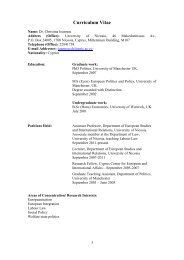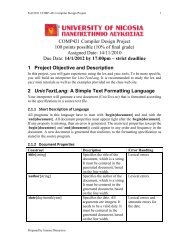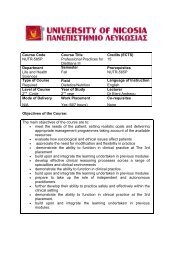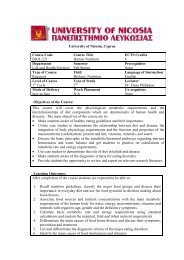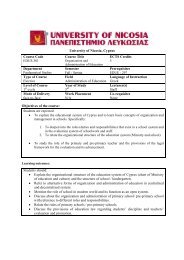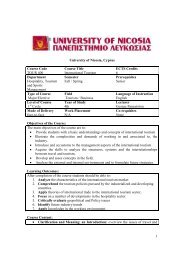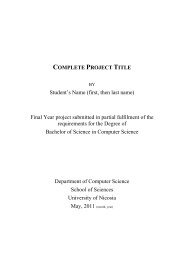University of Nicosia, Cyprus Course Code Course Title ECTS ...
University of Nicosia, Cyprus Course Code Course Title ECTS ...
University of Nicosia, Cyprus Course Code Course Title ECTS ...
- No tags were found...
Create successful ePaper yourself
Turn your PDF publications into a flip-book with our unique Google optimized e-Paper software.
<strong>University</strong> <strong>of</strong> <strong>Nicosia</strong>, <strong>Cyprus</strong><strong>Course</strong> <strong>Code</strong> <strong>Course</strong> <strong>Title</strong> <strong>ECTS</strong> CreditsEDUS-321Greek literature and Greek 6civilizationDepartment Semester PrerequisitesPaedagogical studies Fall, Spring NoneType <strong>of</strong> <strong>Course</strong> Field Language <strong>of</strong> InstructionElective Literature GreekLevel <strong>of</strong> <strong>Course</strong> Year <strong>of</strong> Study Lecturer(s)1 st Cycle 3 rd Dr Vorias StamatisMode <strong>of</strong> Delivery Work Placement Co-requisitesface-to-face N/A NoneObjectives <strong>of</strong> the <strong>Course</strong>:The student have to:• Deepen into the basic texts <strong>of</strong> Greek literature which are connected toeducation, culture and Greek language• To know the feel <strong>of</strong> Greek culture• To understand the relationship <strong>of</strong> culture with politics and education• To explain the concept <strong>of</strong> historical progress and compare the ancient Greekcivilization with the modern (cross – sectional and longitudinal study <strong>of</strong>culture)Learning Outcomes:With the completion <strong>of</strong> the course, students have to:• Analyze the meaning <strong>of</strong> the culture• Explain what is Greek culture• Develop a longitudinal picture <strong>of</strong> the history <strong>of</strong> Greek language and literature• Demonstrate writing text and research work in general, according tointernational standards.<strong>Course</strong> Contents:1. What is Greek culture? The people <strong>of</strong> Greece in the Greek area. People andsociety. Language and culture. Culture and Democracy.2. People and Gods. The ancient Greek religion.3. The science is born. Pre-socrates philosophers. The Metaphysica <strong>of</strong>Aristotelis.4. The transition from myth to reason. Analysis <strong>of</strong> Platonic myth <strong>of</strong> the state5. Ancient Greek thought. The problem <strong>of</strong> time in antiquity. Analysis <strong>of</strong> Platonic
myth <strong>of</strong> the state.6. The enigma <strong>of</strong> Socrates7. Slavery in ancient Greece. The status <strong>of</strong> Women in Plato and Aristotelis8. The “fall” <strong>of</strong> civilization in ancient Greece.9. The genius <strong>of</strong> Alexander the Great10. About aesthetics. The views on music in Ancient Greece11. Thinkers and poets <strong>of</strong> antiquity12. The Byzantine culture: Byzantine art and Byzantine literature. Successes andfailures <strong>of</strong> the Byzantines.13. The Modern Greek Enlightenment.Learning Activities and Teaching Methods:Lectures, Lab Presentations, Lab Tutorials, Practical Exercises and Assignments.Assessment Methods:Homework, Projects, Final Exam.Required Textbooks/Reading:Authors <strong>Title</strong> Publisher Year ISBN∆εσποτόπουλος,Κ.Φιλοσοφία και θεωρία τουπολιτισµού.εκδ.Παπαζήση.2001Μπονάρ, Α. Ο αρχαίος ελληνικόςπολιτισµός, 3 τόµοιΙστορικήΒιβλιοθήκηΘεµέλιο.1991Chamoux, F. Ο Ελληνικός πολιτισµός. ∆αίδαλος – Ι.1999ΖαχαρόπουλοςΓιανναράς, Χ.Κοινωνιοκεντρική πολιτική:Κριτήρια.Εστία 2005



